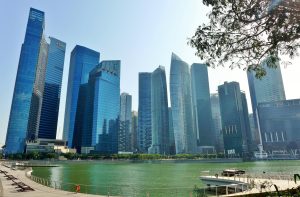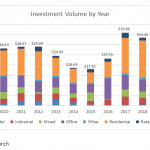CBD Office Rents to drop by 10 percent for the full year 2020 and will continue to decline into 2021
In its latest Market Outlook 2021 video series, Cushman & Wakefield is projecting rents to land at S$9.54 psf/ month by end of 2020, a fall of 10 per cent from last year’s peak of S$10.66 psf/ month.
Companies have started the process of negotiating for shorter leases, convinced that increased flexibility from a prolonged period of work from home will translate to a reduction in in real estate footprint needs.
Mark Lampard, Cushman & Wakefield’s Executive Director and Head of Commercial Leasing Singapore said “Organisations in 2021 will be focused on working from home now being part of the new environment and the cost implications of this. The debate has shifted from whether staff can work from home to how much employees will work from home”.
 Falling CBD office rents may herald some degree of flight to quality, particularly for the firms that are recording growth.
Falling CBD office rents may herald some degree of flight to quality, particularly for the firms that are recording growth.
But by and large, companies will resist capital expenditure. “it is logical that organisations in the CBD, where real estate costs are highest, will place a priority on rental expense management, Conversely companies who are based in the fringe or suburban markets have less room to impact their bottom line as rentals in these markets are lower,” Mr Lampard added.
As CBD office rents fall, co-working will remain very relevant as it provides the much-needed flexibility for tenants in this climate of uncertainty.
Demand for city-fringe and suburban markets is expected to remain healthy because Covid-19 has forced many firms to consider secondary office locations as part of business continuity planning. In fact, the rents in the city fringe and suburban offices are showing less of a decline compared to the Central Business District. Year-to-date 1Q-3Q 2020, CBD grade A office rents have fallen by 7.7 per cent as compared to City Fringe (all grades) and Suburban (all grades) office rents which fell only 1.5 per cent and 1.6 per cent respectively.
As CBD office rents fall, secondary office locations has become a priority for many corporates
Christine Li, Head of Research, Singapore and Southeast Asia, said “As Singapore develops its digital economy and attracts more tech related industries to set up operations in Singapore, cyber security becomes critical. Planning contingencies for secure secondary office locations has become a priority for many corporates and this trend will feed demand for city fringe and suburban locations, including business parks”.
New supply may put additional pressure on CBD office rents
The development of the Central Boulevard site in 2021 will inject an additional 1.3 million sf of new supply in the CBD market and may put pressure on rents further. Nevertheless, prospects for demand remain bright as Singapore continues to attract a sizeable pool of blue chip corporates, particularly amongst pharma, biomedical, technology and its related suite of service providers.
Cushman & Wakefield’s Research mirrors that of CBRE Research which said that Grade A CBD office rents and occupancy will face further downward pressure in the early stages of 2021. The CBRE report said Chinese technology and non-bank financial services firms to fuel demand in 2021. Given Singapore’s political-neutral position and its introduction of new initiatives in terms of policy and tax structures, more Chinese technology firms are displaying strong appetite for expansion within the city.
Office demand in 2021 will also be fueled by non-bank financial services firms such as investment managers and hedge funds. To enforce Singapore’s position as a hub for investment funds, the Monetary Authority of Singapore launched the Variable Capital Companies framework in January 2020.
Grade B market to remain resilient
Some developers have leveraged the CBD Incentive Scheme that was introduced in 2019 by the Urban Redevelopment Authority to rejuvenate their older office stock, which include AXA Tower and Fuji Xerox Towers.
As these buildings are slated to undergo redevelopment, the Grade B office market will witness more occupier movement due to the displacement of occupiers in these buildings. This will lend support to occupancy in the Grade B office market.
Office market performance in 2020
Since the start of 2020, business sentiment was relatively lacklustre and firms across an array of industries were tightening their belts. This prompted many firms to downsize as a form of cost management practice.
Leasing activity in 2020 was primarily driven by renewals and relocations, with a reduction in overall footprint. In the first three quarters of 2020, this amounted to a cumulative negative net absorption of -545,000 square feet.
Preliminary estimates for Q4 2020 indicators seem to suggest that the reduction in occupied space has slowed substantially. In the absence of no new completions in Q4 2020, the islandwide office market registered a net absorption of -14,800 square feet.
For the full year of 2020, overall net absorption amounted to -560,000 square feet, which was well below the 10-year historical annual average net absorption of 1.63 million square feet. Despite having 1.18 million square feet of new completions in 2020, pre-leasing activity in the new-builds were slow and were further impacted by the COVID-19 outbreak.
Based on preliminary leasing data, 2020 year-to-date leasing volume was approximately 1.18 million square feet. Through 2020, there was an increase in vacant stock as firms reduced their footprint upon renewal or relocation. A diverse range of industries, namely financial, insurance and technology, also contributed to the looming secondary space in the market.
This resulted in an increase in islandwide office vacancy from 4.5% in Q4 2019 to 6.0% in Q4 2020. With emerging vacancy in the market, there was downward pressure on Grade A (Core CBD) office rents. In Q4 2020, Grade A Core CBD office rents corrected for its fourth consecutive quarter, declining at 2.8% q-o-q to S$10.40 per square foot per month. This represented a full year decline of 10.0% in Grade A (Core CBD) office rents, which reversed the rental growth of 6.9% in 2019.







